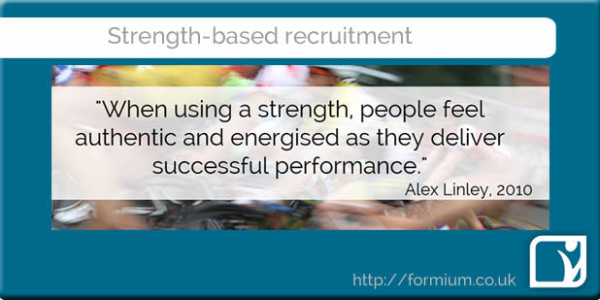Capp founder Alex Linley defines a strength as ‘‘something that you do well and enjoy doing. When using a strength, people feel authentic and energised as they deliver successful performance.’’
We asked Gurpal Minhas, Head of Customer Solutions at Capp & Co Ltd (www.capp.co) , to explain strength-based hiring. Capp work with a range of UK and multinational corporations across the FMCG sector to banking, helping them hire for what applicants are great at doing alongsidewhere their energy passion and motivation lies.
In contrast to traditional competency-based selection, a strength-based approach allows companies to focus on more than just what candidates have previously done or on their competencies, and to consider their potential, engagement and energy. Minhas outlines the business benefits as shorter time to competence, improved engagement, improved performance and reduced attrition. On an individual level, employees are more engaged, and “there’s an increased level of self-esteem because they’re able to work on things that they enjoy and do well.” – he adds.
A strength-based approaches are also shown to create a level playing field between applicants with different social or cultural backgrounds, to improve the employer brand and to attract better-matched candidates.
The process starts with a Success Analysis. The Success Analysis identifies what the best people currently do in that particular role within the organisation. It also considers what the future of the job entails, for instance, how it will look in 2020 or 2025. The requirements are established through stakeholder interviews, focus groups and a review of the existing job description. Where a company has a competency framework, assessments using the competency framework and the strengths framework can be jointly applied. “That’s where that makes a big difference because you continue to be able to use existing language in the organisation, but you’re getting a lot more specific to what you’re looking for” adds Minhas.
The Sucs Analysist establishes a number of core strengths and potentially some role-specific strengths, such as ‘relationship manager’ or ‘Technofinity’ – all of which will be used in attracting and selecting the best candidates, based on a balance of performance, energy and use.
Candidates are assessed against the required strengths through assessment centres, the Situational Strengths Tests and Strength-based Interviews. “A strength-based interview is quite different from competency-based interviews in the fact that assessors are not probing candidates and likewise applicants can’t necessarily prepare for the questions. We may ask 12 questions in 45 minutes, whereas in a competency interview we might ask 6 questions in half an hour. The questions are shorter and significantly more varied. Candidates are having to share a bit more depth about what they do and how they approach tasks. We ask about how you feel about working on tasks- something that with a standard competency response, you can’t necessarily answer,.” explained Gurpal.
When using strength-based interviews, 74% of assessors felt they could better distinguish between low, average and high performers and 85% of candidates agreed the strength-based interview allowed them to show who they really were. In particular Generation Y and Generation Z candidates are eager to learn about themselves, gain more self-insight and feel recognised as individuals. Working in partnership with EY, Capp found in a representative sample of over 1000 students, 65% of graduates would select a job that would allow them to use their strengths rather than a role that paid them a higher salary.
Ultimately strength-based recruitment allows the selection of employees who are naturally, authentically good at the role and are energised by it, which in turn leads to better performance.
Founded in 2005, Capp have an established academic background in positive psychology and an extensive experience in the provision of strengths-based talent management solutions.
The Capp vision is “To match the world to their perfect job” – whether that’s an individual seeking a new challenge or someone growing and developing with their current employer.
You can benefit from the opportunities presented by better understanding applicants’ unique strengths by incorporating strength-based questions into your current selection practice. 9 Strengths-Based Interview Questions for you: Click Here for Your Copy
